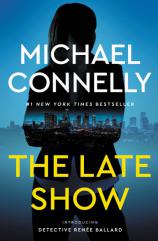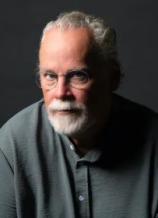Author Talk: July 21, 2017
In a departure from his Harry Bosch and Mickey Haller thrillers, Michael Connelly introduces readers to a brand new protagonist for his 30th novel, THE LATE SHOW. Renée Ballard is a fierce young detective who is fighting to prove herself on the LAPD’s toughest beat. In this interview, Connelly explains why he is starting a new series and what made him decide to create a female lead character again --- his first since Cassie Black in 2000’s VOID MOON. He also discusses why it was so much fun to write about the LAPD Hollywood Station late shift and the possibility of seeing a crossover of characters from his Bosch series.
Question: THE LATE SHOW is your 30th novel. Why are you starting a new series now?
Michael Connelly: Because you have to write like a shark. You keep moving or you die creatively. For 10 years, it’s been Harry and Mickey, with some new secondary characters like Lucia Soto and Legal Siegel thrown into the mix. But I just felt when I turned 60 that I needed to come up with somebody new to carry the next novel and then maybe more stories later. I’m always aware that my books have lots of crossovers among the characters, so I also viewed this as a way of creating a solid new character that might end up in a book with Bosch or Haller.
Q: What made you decide to create a female lead character again --- the last time was in 2000 with VOID MOON and Cassie Black.
MC: In a way, it might have been laziness. Because I went to a ready source for the inspiration of this book. I have known a female homicide detective at the LAPD for a long time, and she has helped me with my Bosch books as well as being a consultant to the “Bosch” TV show. When she mentioned to me a couple years ago that she had worked the midnight shift at Hollywood Division in her past, I immediately became interested and started asking questions. I was drawn to it because on the late show you have to handle everything that requires a detective. I thought that it would be great to break away from the routine where the detective has a particular specialty like homicide.
Q: Without giving too much away, it appears that since Ballard works through the nights, she doesn’t have a strong need for a traditional home life. She is rolling out of work when most people are starting their day. I don’t want to say she is homeless, but it doesn’t seem like she makes it to the home she has very often. Why is that?
MC: I really like playing around with how as adults we subconsciously seek the comforts we found in childhood. Ballard grew up in Hawaii, mostly on beaches and in a bohemian, surfing caravan lifestyle. After a tragedy I won’t reveal here, she spent a year as a teenager living alone on a beach because she was subconsciously longing and looking for something. Now as an adult she is doing something similar, and she is repeating a behavior because there is comfort and home in it, even though to the outside world it might seem plain weird. It’s one of the things I love about Ballard and want to explore further in future books. What is she longing for? Will she ever find it? Couple that with the importance and danger of her job, and I think it raises a lot questions. When writing fiction, questions are good to have. It keeps the words coming.
Q: You’ve described Harry Bosch in one word as “relentless.” What word would you use to describe Renée?
MC: Renée was inspired by a detective I know named Mitzi Roberts. She works homicide now but formerly worked the late show at Hollywood Station. My one-word take on Detective Roberts is that she’s fierce. To me that’s a little bit different from relentless, but they are close. I think fierce means intense, ferocious, and it fits better for a woman trying to operate and do good and important work in a male-dominated profession. It is not fair, but Ballard has to be better at her job than her male counterparts in order to earn respect, and she has to be fierce to get there.
Q: Renée works the LAPD Hollywood Station late shift and initially covers all kinds of crimes, not just murders. Was it fun to write about other kinds of crimes and investigations for a change?
MC: I was really drawn to writing about the late show because of the variety I knew I could bring. Renée does not have one particular expertise or crime she handles. She has to handle it all, and that variety I know would be good for fiction, especially if I had plans to make this a series. Now with Renée and the series established, I can pursue all kinds of things to bring to her --- just as long as they happen after midnight.
Q: Will we see a crossover of characters from the Bosch series?
MC: I would fully expect to see a crossover of Ballard and other characters I have written about. It’s what I love to do. All the books are part of a whole, if you ask me. I look forward to the moment Ballard and Bosch have a conversation. That might even be a good title, Ballard and Bosch. Has a nice ring to it.




